Olympics Day 2 Notebook: Time for Emma McKeon’s Individual Shining Moment?
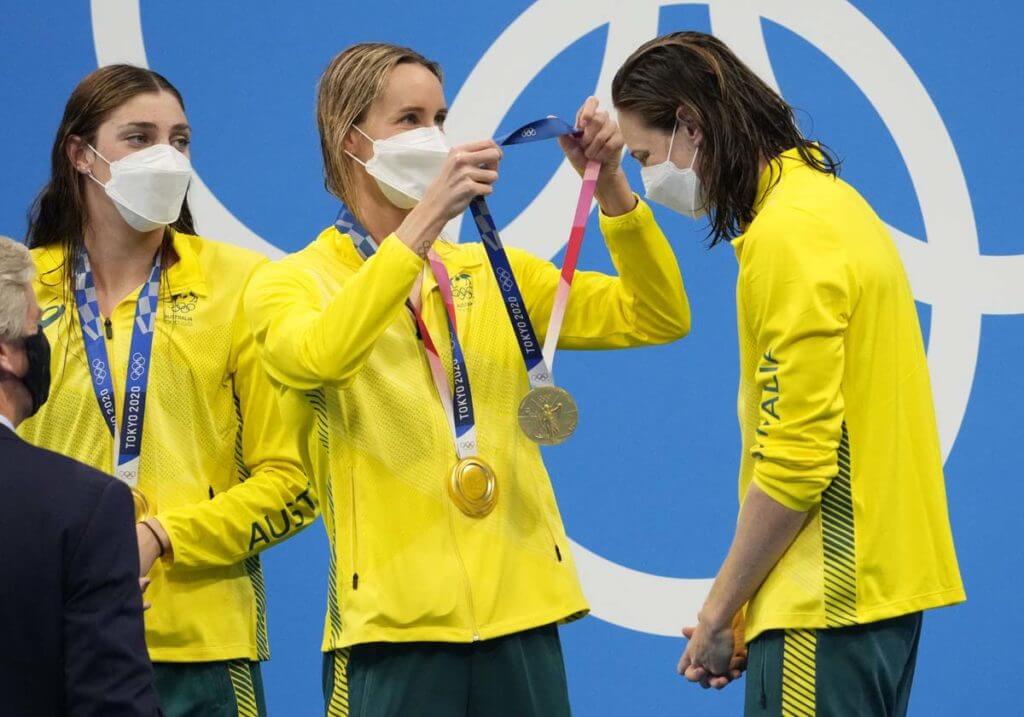
Editorial content for the 2021 Tokyo Olympic Games coverage is sponsored by GMX7.
See full event coverage. Follow GMX7 on Instagram at @GMX7training #gmx7

Olympics Day 2 Notebook: Time for Emma McKeon’s Individual Shining Moment?
Emma McKeon has been an international force for Australia since 2013, a presence never missing from the Dolphins’ lineup in any of the relay events at an international meet during that eight-year span. She has won 17 medals at World Championships in her career, 14 of those on relays, and four of her five Olympic medals came on relays, including both golds (in the 400 free relay in 2016 and then already in Tokyo). Over the years, McKeon turned herself into a bona fide medal contender in individual events, too, beginning with a bronze in the 200 free at the 2016 Olympics and then a pair of silvers in the 100 fly and 200 free at the World Championships one year later.
But McKeon was still overshadowed – significantly – by her fellow Australians. Cate Campbell is a four-time Olympian and one of the country’s all-time great sprinters, a world-record breaker and world-title winner, even though she has never won individual Olympic gold. Cate’s younger sister, Bronte, has also won individual world titles. It was always about the Campbell sisters leading Australia, and McKeon was in a supporting role.
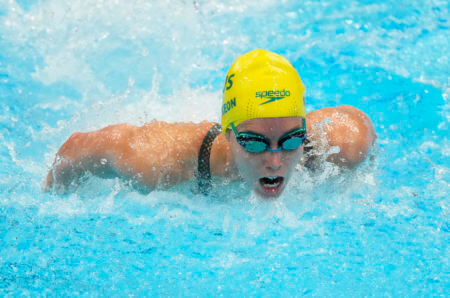
Emma McKeon — Photo Courtesy: Rob Schumacher — USA Today Sports
Now, McKeon is in the spotlight, and she could win Australia’s first individual Olympic gold of these Olympics. McKeon was the third-fastest qualifier for the women’s 100 butterfly final, but her prelims time of 55.82 was her lifetime best and tied with China’s Zhang Yufei as the top time of the Games so far. McKeon now ranks fourth all-time in the event. Everyone in the historical top five will be competing in the Tokyo final, the first race up on the Monday morning finals slate, but McKeon has a very real shot of winning that.
If she comes up short in the 100 fly, McKeon has to be considered the favorite for gold right now in the 100 free, an event she has often not competed in internationally due to the Campbell sisters’ presence. McKeon holds the world’s fastest time in that event at 52.29, and her 51.35 split on Australia’s gold-medal winning 400 free relay was the only sub-52 split of all 32 swimmers in the final.
And if McKeon wins gold in the 100 fly, she would actually become the first Australian woman to claim individual gold in the pool in a whopping 13 years, since Leisel Jones (100 breast), Libby Trickett (100 fly) and Stephanie Rice (200 and 400 IM) won gold at the 2008 Olympics in Beijing. McKeon in the 100 free and Kaylee McKeown in the backstroke events will present other opportunities for Australia to break the individual golden drought this week.
Tatjana Schoenmaker Ready to Rival Lilly King in 100 Breaststroke?
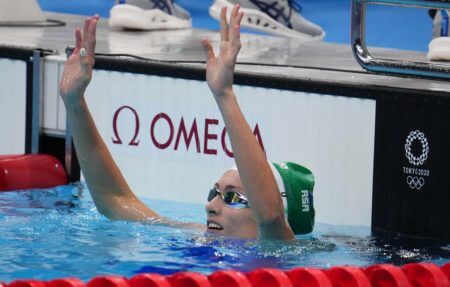
Tatjana Schoenmaker after setting an Olympic record in the women’s 100 breast — Photo Courtesy: Robert Hanashiro — USA Today Sports
Prior to the Games, Tatjana Schoenmaker was a legitimate contender for Olympic gold in the 200 breaststroke (her 2:20.17 earlier this year was the quickest time recorded since 2017), but she was hardly a contender in the 100-meter event. But now, she holds the Olympic record, her prelims time of 1:04.82 beating Lilly King’s mark of 1:04.93 set on her way to Olympic gold in 2016.
That marks the first time in King’s international career that she has ever had a record broken. King qualified third for the semifinals in 1:05.55, and while she has been faster than Schoenmaker’s time this year, it was only by a tenth of a second.
King, of course, has been known for responding in force to challenges to her dominance in the shorter breaststroke race, which she has not lost since U.S. Nationals in 2015, when she was 18. Few can forget her Rio rivalry with Russia’s Yuliya Efimova, and more recently, she has motivated herself by thinking about a rivalry with “one little Italian girl.” That refers to 16-year-old Benedetta Pilato, who challenged King on last year’s ISL circuit and recent broke King’s world record in the 50 breast. In Tokyo, Pilato was disqualified in the 100 breast and would not have qualified for the semifinals anyway.
But now King has a new 100-meter challenger, Schoenmaker, and lo and behold, the duo will race in adjacent lanes in the second semifinal. Let’s see how King responds.
Meanwhile, South Africa’s men have had considerable Olympic success in the pool recently, winning medals at four of the last five Games and gold medals in 2004 and 2012, but Schoenmaker is aiming to become South Africa’s first female Olympic gold medalist in swimming since Penny Heyns swept the 100 and 200 breast gold medals in 1996 and the first female medalist since Heyns won 100-meter bronze in 2000. The only other South African woman to ever win Olympic gold in the pool was Joan Harrison in the 100 back at the 1952 Games.
Men’s 100 Backstroke Taking Shape
This event did not see three different swimmers take down the Olympic record in succession, which is what happened in the women’s version of the 100 back. Instead, the four main contenders for gold took very different approaches to their first round. China’s Xu Jiayu went for it early but then pulled back slightly. He ended up third for semifinals in 52.70. Then, Russia’s Kliment Kolesnikov went out in a ridiculous 24.89, more than two tenths under world-record pace and did not fade badly. He ended up swimming a 52.15, just 0.02 off his seed time, and that was good for first place going into semifinals.
But in the last heat, world-record holder Ryan Murphy and 200 back world champion Evgeny Rylov took it easy on the front half, each of their splits more than a second behind Kolesnikov’s, and then they did just enough to get into the final. They each touched in 53.22 to tie for seventh place.
So what did we learn from the prelims? Honestly, nothing. But when gold is at stake in the final, expect Kolesnikov to be out really, really fast. He probably can’t hold onto whatever pace he sets, but it will be a tall task for Xu, Murphy, Rylov or anyone else to run him down.
Also of note, both Kolesnikov and Rylov are scheduled to swim in the second semifinal, scheduled for 11:37 a.m. Tokyo time. Then, at least Kolesnikov and likely Rylov, too, will then turn around to compete on Russia’s 400 free relay, set for 12:05 p.m. That’s a quick turnaround, so we’ll see how much it affects them. At the European Championships in May, Kolesnikov had to swim the 100 back semifinal just 10 minutes after the 100 free final, and he struggled badly, ending up 16th overall in one of his best events.
Another Japanese Gold Medal Contender Misses Out
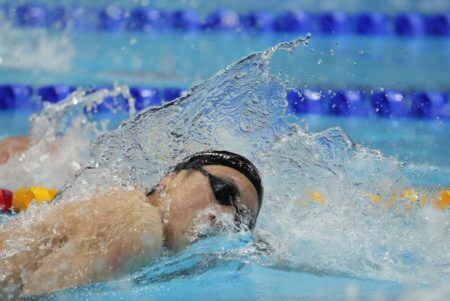
Katsuhiro Matsumoto — Photo Courtesy: Rob Schumacher — USA Today Sports
After Daiya Seto finished ninth in the men’s 400 IM on day one, the same misfortune felled another standout for the home nation, Katsuhiro Matsumoto. The silver medalist in the 200 free at the 2019 World Championships and third-ranked swimmer in the world entering the day, Matsumoto swam a 1:46.69 in the 200 free, 0.02 behind 16th-place Stefano di Colla of Italy. Making the situation even more disappointing, Matsumoto ended up tying for 17th, so he had to swim off for first alternate. In that swim-off, he put up a 1:46.06 to beat Germany’s Lukas Martens, and that time would have comfortably qualified him for the semifinals in 11th place.
Yui Ohashi earned Japan a gold medal in the women’s 400 IM on day one, but Matsumoto had one of the best remaining chances to add to that haul of top honors.
More History for Allison Schmitt
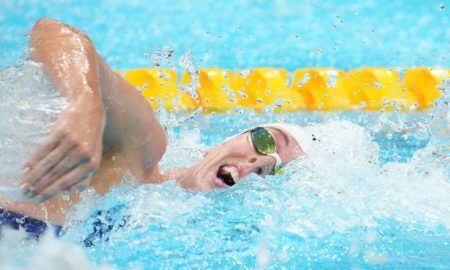
Allison Schmitt competing in the women’s 400 free relay prelims at the Olympics — Photo Courtesy: Robert Hanashiro — USA Today Sports
When Allison Schmitt swam her first race of the Tokyo Olympics Saturday evening, she did not have a great split on the U.S. women’s 400 free relay in prelims (54.04), but she helped the team qualify for the final and eventually earned a bronze medal for her efforts. That helped bolster Schmitt’s standings in the history books. According to Olympic historian Bill Mallon, Schmitt is now the 13th American woman in any sport to earn medals in four different Olympics and only the third U.S. swimmer to do so, joining Jenny Thompson and Dara Torres.
Schmitt now owns nine Olympic medals for her career (including seven relay medals), and that ranks her tied for 15th among women in all sports for most career medals and tied for fourth among Americans with track star Allyson Felix. The only U.S. swimmers with more medals are Thompson, Torres and Natalie Coughlin, who each own 12.
She is the 13th @TeamUSA woman to win medals at 4 Olympic Games. She is also the 5th female swimmer to win medals at 4+ Olympics, and the 3rd USA woman to win swim medals at 4+ Olympics – after Jenny Thompson and Dara Torres (who did it in 5). 3/n
— Bill Mallon (@bambam1729) July 25, 2021
Schmitt and Felix trail only USA swimmers Dara Torres, Natalie Coughlin, and Jenny Thompson, all of whom won 12 Olympic swim medals, which is 3rd most all-time among Olympic women – after Soviet gymnast Larisa Latynina and Norwegian XC skier Marit Bjørgen. 5/end
— Bill Mallon (@bambam1729) July 25, 2021
Morning Finals Woes?
In the men’s 400 IM, seven of the eight swimmers were slower in the Sunday morning final than in Saturday evening’s qualifying round. So pronounced was the difference that gold medalist Chase Kalisz was slower than Brendon Smith’s top qualifying time out of prelims while Jay Litherland claimed silver in 4:10.28, slower than the eighth-place qualifying time out of prelims.
None of the other finals on day one saw that much of a slowdown from prelims to finals, but it’s worth keeping an eye on to see if this becomes a trend over the course of the eight days of swimming at the Olympics.




